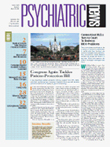Psychiatrists Donald Fidler, M.D., Ruth Levine, M.D., and Ronald Rieder, M.D., are the “master teachers” selected for the Master Educator Clinical Consultation (MECC) series at APA’s 2001 annual meeting in New Orleans.
The MECC sessions are designed for attendees to have an “up close and personal” interaction with master educators. Limited to only 30 participants, the sessions give the audience an opportunity to ask questions about teaching techniques in a more intimate format.
The master educators were selected after APA’s Council on Medical Education and Career Development asked for nominations for an outstanding medical educator from each of three allied academic organizations: the Association of Directors of Medical Student Education in Psychiatry, the Association for Academic Psychiatry, and the American Association of Directors of Psychiatric Residency Training.
Ruth Levine, M.D., who was selected by the Association of Directors of Medical Student Education in Psychiatry, will speak on “Using Cinema to Enhance the Teaching of Psychiatry and Behavioral Sciences.” She is an associate professor and director of medical student education in the department of psychiatry and behavioral sciences at the University of Texas Medical Branch in Galveston, Tex. Those who attend her session on Monday, May 7, at 11 a.m. will have the chance to learn how media can perpetuate the stigma of mental illness. Attendees will also learn how to use film clips to teach the mental status exam, illustrate psychopathology, and serve as a springboard for discussion of such topics as the doctor-patient relationship, forensic issues, interpersonal dynamics, and psychotherapy.
The Association for Academic Psychiatry selected Donald Fidler, M.D., a professor of psychiatry and an instructor in theater at West Virginia University. On Tuesday, May 8, at 9 a.m. he will demonstrate examples of the many methods in teaching psychiatry through “topic-centered learning.” Fidler will discuss the importance of putting the topic before all other concerns and engaging students and teachers in exploring and learning “truths” about topics and about their own thinking as they make clinical decisions.
One of Fidler’s educational interests is the combining of theater, film, and video with medical education. He teaches advanced acting to the undergraduate and graduate students in the university’s theater department. He has written several plays, including “Voices in the Woods,” which played to sold-out audiences in Los Angeles. Fidler is also the director of West Virginia University’s Health Sciences Teaching Scholars Program, which he helped to initiate and develop with faculty from the schools of dentistry, medicine, nursing, and pharmacy. He has won several teaching awards, including APA’s Nancy C.A. Roeske, M.D., Certificate of Recognition for Excellence in Medical Student Education.
Ronald O. Rieder, M.D., is director of residency education and vice chair for education in the department of psychiatry of Columbia University. He was nominated by the American Association of Directors of Psychiatric Residency Training. Rieder spent eight years in the Intramural Research Program of the National Institute of Mental Health conducting research on schizophrenia. He came to Columbia in 1979 to direct the residency program. In 1998 Rieder received the department of psychiatry’s Medical Student Teaching Award for his lectures on schizophrenia. He also oversees postresidency fellowship training at Columbia and is responsible for the administration of two postresidency NIMH-supported research training programs.
Rieder will speak on Wednesday, May 9, at 11 a.m. on “Teaching Psychopathology to Medical Students.” He will present segments of the two lectures on schizophrenia he gives to first-year medical students in a course on psychiatric disorders. The first lecture introduces students to the phenomenology of the illness, and the second describes research data and theories of etiology and pathogenesis, illustrating the illness with a video of a patient with whom he has worked. He will also compare letters the patient wrote while sane with those written while psychotic. The lecture enables students to appreciate this illness from the inside—the fear, confusion, misperceptions, anxiety, and sadness. The second lecture he will demonstrate focuses on the “myth of mental illness” proposals of Thomas Szasz, M.D., and relevant biological data such as brain-imaging findings. Rieder will discuss these and other methods of getting students who have not yet had direct clinical experiences and are skeptical of the concept of psychiatric illness excited about psychiatry and interested in learning more about psychiatric illness.
The locations for all three sessions will be published in the program book distributed at registration. ▪
